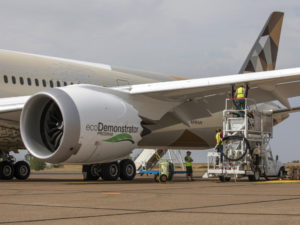A longstanding manufacturer-airline partnership to make flying more sustainable
Boeing and Etihad Airways concluded testing on the aerospace company’s 2020 ecoDemonstrator programme last week with a cross-country flight using a 50/50 blend of sustainable and traditional jet fuel.

Flying from Seattle to Boeing’s manufacturing site in South Carolina, Etihad’s newest 787-10 Dreamliner used the maximum sustainable fuel blend permitted for commercial aviation. The transcontinental flight also demonstrated a new way for pilots, air traffic controllers and airline operations centres to communicate simultaneously and optimize routing, according to a corporate press release.
“This is a monumental step forward for the sector to prove the viability of producing a 50/50 blend of sustainable aviation fuel at a high volume, an important moment for the industry,” affirmed Mohammad Al Bulooki, COO, Etihad Aviation Group.
Boeing’s ecoDemonstrator programme takes promising technologies out of the lab and tests them in the air to accelerate innovation. This year’s programme evaluated four projects to reduce emissions and noise and enhance the safety and health of passengers and crew.
“Sustainable aviation fuels are proven and work in airplanes flying today and those that will fly tomorrow, but there’s a very limited supply,” observed Sheila Remes, VP, Strategy, Boeing Commercial Airplanes.
“We congratulate Boeing and Etihad for their industry leadership in helping push the technical and sustainability boundaries of SAF,” remarked Bryan Sherbacow, CCO, World Energy.
The partnership between Boeing and Etihad Airways represents a longstanding collaboration to make flying more sustainable. Based at Khalifa University near Abu Dhabi, the pilot project for a unique desert ecosystem produces sustainable fuel from plants that grow in the desert, irrigated by coastal seawater.
